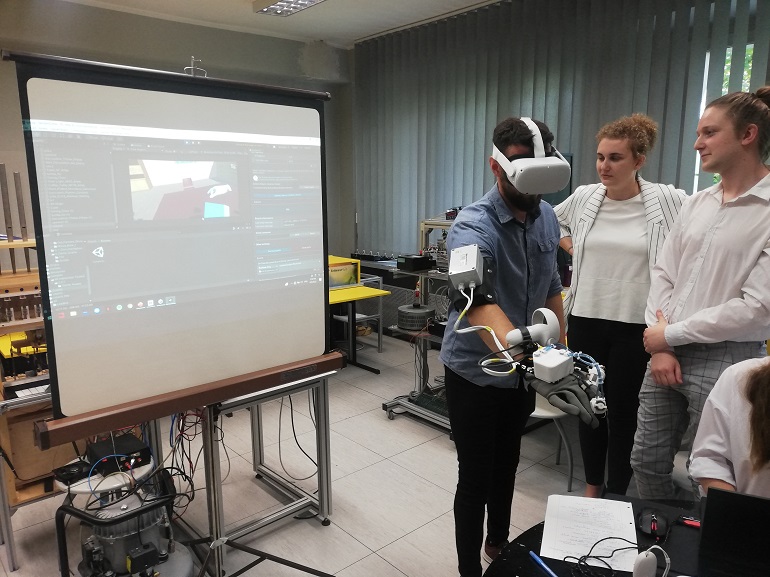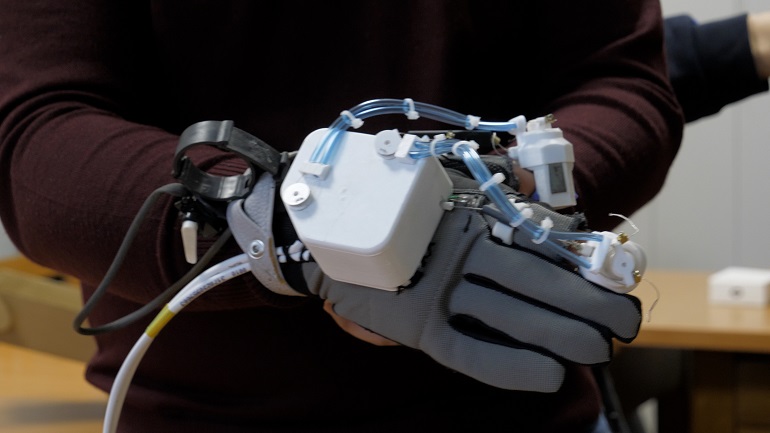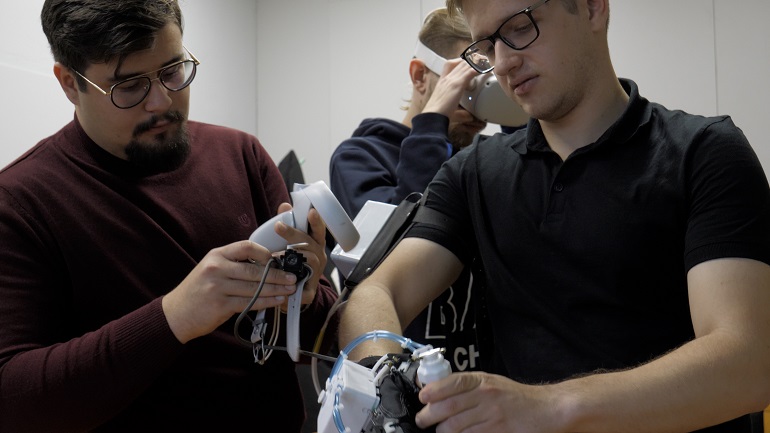Start - Aktualności - Tailor-made education

Tailor-made education
What to do after graduation? What studies should I choose in order to find a good and satisfying job? Is it worth studying at all? These are the questions that today's 20-year-olds, Generation Z, i.e., those born at the beginning of the 21st century, ask themselves. This is the Internet generation, the first to grow up in a digitized society. They focus on their own ideas; they are creative and ambitious. They are making decisions that may affect their future, and many of them believe that it is not worth investing their time in studies. Universities, in turn, are looking for ways to convince them that higher education is the best investment.
Here is a glove that, thanks to the use of tactile technology, allows the user to feel the virtual reality. Pick up an item in the VR world and feel its texture. It is the result of cooperation between 11 students from the Faculty of Automatic Control, Electronics and Computer Science, the Faculty of Electrical Engineering and the Faculty of Biomedical Engineering as part of two editions of the Project Based Learning (PBL) project. Young people, under the supervision of tutors and experts, created a prototype of a compact, portable device that gives the opportunity to feel feedback with the sense of touch. Currently, the project, whose originator is Dr. Eng. Paweł Kowol from the Department of Mechatronics of the Faculty of Electrical Engineering, the third group of students has already started work.

- The idea to develop a Tactile Feedback system with a controlled touch sensation arose from my scientific interests related to the use of magnetorheological fluids in mechatronics, - explains Dr. Eng. Kowol. - This is another PBL that I carry out with my students, earlier we worked on the use of mechatronics and haptic technology in an organ instrument, then I learned about the possibilities offered by participation in similar projects and it inspired me to apply in the next edition - this is how the idea of creating a tactile glove was born, which aroused great interest among students.
The device that students created during the first edition of PBL was improved by another group. They built a prototype using a magnetorheological liquid that changes its viscosity in a magnetic field, thoroughly modernized the mechatronic system that controls a mobile magnetic field exciter in the glove system, and developed a control system that allows the glove system to work independently. Students conducted an analysis of hand kinematics, created virtual reality software for the system in the Unity environment, which is projected in VR goggles. The gripping feel of virtual elements simulates the layout of a glove.
- We worked like engineers, discussed our concepts during a brainstorming session, initially made three prototypes, tested them and constantly improved them - says Szymon Skupień, participant in the second edition of PBL. - First of all, we learned how to work in an interdisciplinary team, which I consider very beneficial, because we could also get to know the scope of knowledge of people studying in other fields and learn a lot from them. It required much more commitment from us than with ordinary classes or laboratories, but instead of pressure and stress that accompany some students, there was great satisfaction and a sense of deepening knowledge by turning theory into practice. And this is what most of my younger colleagues expect from their studies - adds Szymon, currently a second-cycle student of electrical engineering. Together with the team, he introduced another group of six students from the Faculty of Electrical and Mechanical Engineering into the project, who will improve it, enriched by the knowledge and experience of their colleagues.

- I actually observe that current students are more interested in the practical side of engineering, thanks to the Internet they are better acquainted with new technologies than, for example, their colleagues a decade ago, and they want real contact with modern engineering - notes the project supervisor, Dr. Eng. Pawel Kowol. - This "hunger" for practical knowledge can be perfectly utilized in PBL projects, in scientific clubs or by engaging them in research activities. Working with young people in project teams brings mutual benefits. They draw on our knowledge and experience, and we, thanks to their energy, openness to novelties and enthusiasm, have a lot of motivation to develop - he adds.
Project Based Learning is one of the responses of the Silesian University of Technology to the expectations of students. The idea of introducing this modern teaching method met with great interest from both students and lecturers. Currently, the 9th edition is underway, financed from the PO WER program, under which about 200 PBLs will be implemented, although twice as many were forecasted. Taking into account also other sources of financing, since 2018, over 1,000 projects have been implemented at the University.
The subject matter of the works is diverse, innovative and ambitious. These ideas range from the research of rocket fuels, the possibility of using industrial waste as substitutes for natural resources, innovative photovoltaic control systems, through the construction of a robot prototype, the development of 3D printing technology of geopolymers based on waste materials, and ending with the study of the impact of stress during public appearances or architectural upcycling in the theatre . What is important from the point of view of students, participation in a semester PBL project gives them the opportunity to earn up to 15 ECTS credits.
- This form of education enables the acquisition of competences that go beyond the scope of the study program - emphasizes Dr. Eng. Dariusz Buchczik, coordinator of PBL projects at the University - and above all, it develops the ability to cooperate in a team. In addition, project education allows students to engage in scientific research and ambitious development work, enables the creation of innovative thinking and leads to the expansion of their practical skills in solving problems in interdisciplinary project teams, often in cooperation with foreign research centres and external economic entities - he enumerates.
These are extremely important advantages, considering the fact that technological progress forces dynamic changes on the labour market. Therefore, universities must constantly improve their curricula.

– Experts predict that young people entering the labour market today will change their profession even 7-8 times during their lifetime. That is why we must teach them creativity, teamwork skills, interpersonal communication and develop the ability to solve problems, often in interdisciplinary, international teams - explains prof. dr hab. Eng. Wojciech Szkliniarz, Vice-Rector for Student Affairs and Education. – The current educational offer of the University includes new and mostly improved fields of study. Students have a maximum 25-hour week of classes, can change their field of study without any curriculum differences even after the first year of study, can take part in free compensatory classes in mathematics and physics, which they learn in a more friendly form, can use the university database of elective classes (UBZO). We want to give them greater flexibility so that they can shape their own, often interdisciplinary, scope of study. We also put emphasis on practical classes conducted in the form of laboratory classes and in modern forms of PBL and Design Thinking - emphasizes prof. Szkliniarz.
The University's response to the need to organize more interdisciplinary education is also the general engineering course run at the Silesian University of Technology for two years, unique in Poland, which includes an interdisciplinary study program related to various engineering disciplines (mechanical, electrical, chemical, material engineering , manufacturing, aerospace, land, environment, biomedical). From the academic year 2023/2024, this field of study will play a special role in the process of making education in undergraduate studies more flexible, as it can be applied for by students who are still not sure what they want to study. Introducing them to the broad spectrum of engineering courses available at the Silesian University of Technology and the support of experienced advisors will enable them to make much more informed decisions regarding their educational paths. At the end of the first year of study, they will be able to choose the right field of study and transfer to it without any curriculum differences.
The research of the Incubator and Evaluation Centre of the University of Warsaw on the prospects, sense of agency and vision of the future of students shows that as many as 90% of them assess the current economic situation as unstable, and 86% are afraid of what the world will be like in the future. At the same time, the report shows that for Generation Z, it is important that work is not just a mechanical performance of activities, but gives opportunities for development and, above all, allows to change the surrounding world. These are the kind of graduates we want to promote - brave, able to work in an interdisciplinary team, creators of progress - adds Vice-Rector Wojciech Szkliniarz. In his opinion, the system of higher education in the country it is not always adapted to students' abilities, often not practical enough and therefore not effective enough. That is why in recent years at the Silesian University of Technology curricula of individual fields of study were modified. The student became the subject, not the object of education, and the teacher became a guide in this process, developing independence, not suppressing curiosity, allowing to see the need for lifelong learning. Study programs must focus on developing the ability to search, process and present information instead of memorizing it, on teaching problem solving instead of providing ready-made solutions, and finally on educating young people to work in a team instead of constantly working alone. It is important to learn to learn and to be able to separate the important from the unimportant. This is invaluable knowledge for life.








